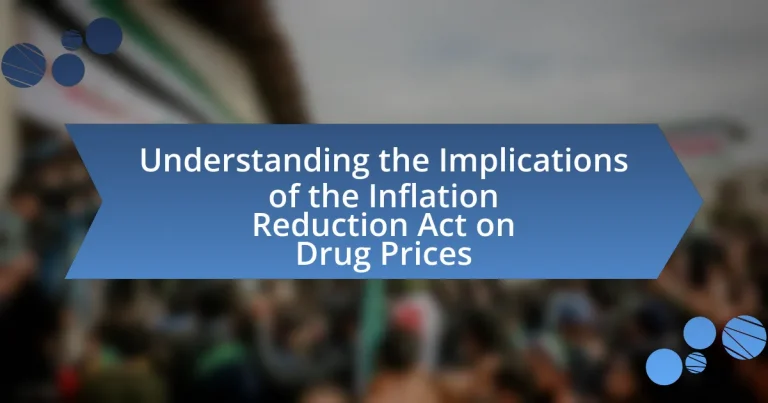The Inflation Reduction Act is a significant piece of legislation aimed at addressing the rising costs of healthcare, particularly prescription drugs. Key features include allowing Medicare to negotiate prices for high-cost medications, capping insulin costs at $35 per month for beneficiaries, and extending health insurance premium subsidies. The Act is expected to lower out-of-pocket expenses for seniors and individuals with disabilities, potentially saving Medicare beneficiaries billions over the next decade. Additionally, it imposes penalties on pharmaceutical companies for excessive price increases and promotes competition by facilitating the entry of generic drugs into the market. The broader implications of the Act include enhanced healthcare accessibility and affordability, particularly for underserved populations, while also presenting challenges related to implementation and potential legal disputes.

What are the key features of the Inflation Reduction Act?
The key features of the Inflation Reduction Act include provisions aimed at reducing healthcare costs, particularly for prescription drugs. This legislation allows Medicare to negotiate prices for certain high-cost medications, which is expected to lower out-of-pocket expenses for seniors. Additionally, the Act caps insulin costs at $35 per month for Medicare beneficiaries and extends subsidies for health insurance premiums under the Affordable Care Act. These measures are designed to enhance affordability and accessibility of healthcare, directly impacting drug prices and overall healthcare spending.
How does the Inflation Reduction Act aim to impact drug prices?
The Inflation Reduction Act aims to impact drug prices by allowing Medicare to negotiate prices for certain high-cost medications. This provision is designed to lower out-of-pocket costs for seniors and reduce overall spending on prescription drugs. The act specifically targets medications that have been on the market for a significant period without competition, enabling Medicare to leverage its purchasing power to secure lower prices. According to the Congressional Budget Office, this negotiation could save Medicare and beneficiaries billions of dollars over the next decade, demonstrating the act’s potential effectiveness in addressing high drug costs.
What specific provisions in the Act target drug pricing?
The Inflation Reduction Act includes specific provisions that target drug pricing by allowing Medicare to negotiate prices for certain high-cost medications. This negotiation process is aimed at reducing out-of-pocket costs for beneficiaries and lowering overall drug expenditures. Additionally, the Act imposes penalties on pharmaceutical companies that raise prices faster than inflation for drugs covered by Medicare, ensuring that price increases are kept in check. These measures are designed to enhance affordability and accessibility of essential medications for consumers.
How does the Act propose to negotiate drug prices?
The Act proposes to negotiate drug prices by allowing Medicare to directly negotiate prices for certain high-cost medications. This negotiation process is aimed at reducing the overall costs of prescription drugs for beneficiaries and taxpayers. Specifically, the Act targets drugs that have been on the market for a significant period without competition, enabling Medicare to leverage its purchasing power to secure lower prices. This approach is supported by data indicating that direct negotiation can lead to substantial savings, as evidenced by similar practices in other countries where drug prices are significantly lower due to government negotiation.
What are the expected outcomes of the Inflation Reduction Act on drug affordability?
The expected outcomes of the Inflation Reduction Act on drug affordability include a significant reduction in prescription drug costs for consumers. The Act allows Medicare to negotiate prices for certain high-cost medications, which is projected to lower out-of-pocket expenses for seniors and individuals with disabilities. According to the Congressional Budget Office, this negotiation could save Medicare beneficiaries an estimated $98 billion over ten years, directly impacting affordability. Additionally, the Act implements a cap on out-of-pocket spending for Medicare recipients, further enhancing financial accessibility to necessary medications.
How will the Act affect out-of-pocket costs for consumers?
The Act will reduce out-of-pocket costs for consumers by implementing price negotiations for certain high-cost prescription drugs. This is expected to lower the prices that consumers pay at the pharmacy counter, as the government will negotiate directly with pharmaceutical companies to establish fairer prices. For instance, the Inflation Reduction Act allows Medicare to negotiate prices for select drugs starting in 2026, which could lead to significant savings for beneficiaries. Additionally, the Act includes provisions to cap out-of-pocket expenses for Medicare recipients at $2,000 annually, further alleviating financial burdens.
What impact might the Act have on insurance premiums?
The Act may lead to a decrease in insurance premiums. By allowing Medicare to negotiate drug prices, the Inflation Reduction Act aims to lower overall healthcare costs, which can reduce the financial burden on insurers. As a result, insurers may pass these savings onto consumers in the form of lower premiums. Historical data indicates that similar legislative measures have previously resulted in reduced costs for both insurers and consumers, supporting the likelihood of this outcome.

How does the Inflation Reduction Act influence pharmaceutical companies?
The Inflation Reduction Act influences pharmaceutical companies by enabling the federal government to negotiate prices for certain high-cost medications, which can lead to reduced revenue for these companies. This act specifically targets drugs that are part of Medicare, allowing the government to negotiate prices starting in 2026 for select medications, which is expected to lower costs for consumers and potentially impact the profit margins of pharmaceutical firms. According to the Congressional Budget Office, this could save the government approximately $98 billion over a decade, indicating a significant shift in how drug pricing is managed and potentially altering the financial landscape for pharmaceutical companies.
What changes will pharmaceutical companies need to implement?
Pharmaceutical companies will need to implement price negotiation strategies and transparency in pricing due to the Inflation Reduction Act. This legislation allows Medicare to negotiate prices for certain high-cost drugs, compelling companies to adjust their pricing models to remain competitive and compliant. Additionally, companies must enhance their reporting practices to provide clear information on drug pricing and cost structures, as mandated by the Act. These changes are essential for maintaining market access and ensuring compliance with new regulatory requirements.
How might the Act affect drug development and innovation?
The Act may hinder drug development and innovation by imposing price controls on pharmaceuticals, which can reduce the financial incentives for companies to invest in research and development. Historical data indicates that when similar price regulation measures were implemented, such as in European countries, there was a notable decline in the number of new drug approvals and a slowdown in the introduction of innovative therapies. For instance, a study by the National Bureau of Economic Research found that price controls can lead to a 20% decrease in the number of new drugs brought to market. This suggests that the Act could potentially stifle the advancement of new treatments and technologies in the pharmaceutical industry.
What are the potential financial implications for pharmaceutical companies?
The potential financial implications for pharmaceutical companies include reduced revenue from drug sales due to price negotiations mandated by the Inflation Reduction Act. This legislation allows the government to negotiate prices for certain high-cost medications, which can lead to lower profit margins for these companies. For instance, a study by the Congressional Budget Office estimated that the act could save the federal government approximately $100 billion over ten years, indicating a significant impact on pharmaceutical revenues. Additionally, companies may face increased pressure to invest in research and development to offset potential losses from price reductions, thereby altering their financial strategies and resource allocation.
How will the Act affect competition in the pharmaceutical market?
The Act will enhance competition in the pharmaceutical market by allowing Medicare to negotiate prices for certain high-cost drugs. This negotiation is expected to lower prices, thereby increasing access and potentially driving other manufacturers to lower their prices to remain competitive. Historical data indicates that when price negotiations are implemented, as seen in other countries with similar policies, overall drug costs tend to decrease, fostering a more competitive environment.
What role does the Act play in promoting generic drugs?
The Act plays a significant role in promoting generic drugs by facilitating their entry into the market and enhancing competition. Specifically, the Inflation Reduction Act includes provisions that allow for the negotiation of drug prices, which can lead to lower costs for consumers and incentivize the development of generic alternatives. By reducing the financial barriers for generic manufacturers, the Act encourages more companies to produce generic drugs, thereby increasing availability and affordability. This is supported by the fact that increased competition from generics typically results in price reductions for both brand-name and generic medications, ultimately benefiting consumers.
How might the Act influence pricing strategies among drug manufacturers?
The Act may lead drug manufacturers to adopt more competitive pricing strategies. By imposing price negotiation provisions for certain high-cost medications, the Act incentivizes manufacturers to lower prices to maintain market share and comply with regulatory requirements. For instance, the Inflation Reduction Act allows Medicare to negotiate prices for select drugs, which could pressure manufacturers to adjust their pricing models to avoid losing access to a significant customer base. This shift towards negotiation may result in reduced profit margins for some drugs, prompting manufacturers to reevaluate their pricing strategies across their portfolios.

What are the broader implications of the Inflation Reduction Act on healthcare?
The broader implications of the Inflation Reduction Act on healthcare include a significant reduction in prescription drug costs and increased access to affordable medications for millions of Americans. The Act allows Medicare to negotiate prices for certain high-cost drugs, which is projected to lower out-of-pocket expenses for seniors and reduce overall healthcare spending. According to the Congressional Budget Office, this could save Medicare and beneficiaries approximately $98 billion over the next decade. Additionally, the Act caps insulin prices at $35 per month for Medicare beneficiaries, directly addressing affordability issues for chronic conditions. These measures aim to enhance healthcare equity and improve health outcomes by making essential medications more accessible.
How does the Act align with overall healthcare reform efforts?
The Act aligns with overall healthcare reform efforts by aiming to reduce prescription drug costs and improve access to medications for consumers. Specifically, the Inflation Reduction Act introduces measures such as allowing Medicare to negotiate drug prices, which directly addresses the rising costs of healthcare that have been a focal point of reform initiatives. According to the Congressional Budget Office, these negotiations could save Medicare and beneficiaries billions of dollars, thereby enhancing affordability and accessibility in the healthcare system. This alignment with broader reform goals reflects a commitment to making healthcare more equitable and sustainable for all Americans.
What are the potential long-term effects on public health?
The potential long-term effects on public health include improved access to medications, reduced healthcare costs, and enhanced health outcomes. The Inflation Reduction Act aims to lower prescription drug prices, which can lead to increased medication adherence among patients. Studies indicate that when patients can afford their medications, they are more likely to manage chronic conditions effectively, resulting in fewer hospitalizations and better overall health. For instance, a report from the Kaiser Family Foundation highlights that lowering drug costs can significantly reduce the financial burden on families, thereby improving their health and well-being.
How might the Act influence healthcare accessibility for underserved populations?
The Act may enhance healthcare accessibility for underserved populations by lowering prescription drug prices, thereby reducing financial barriers to necessary medications. By allowing Medicare to negotiate prices for certain high-cost drugs, the Act aims to make essential treatments more affordable for low-income individuals and families. For instance, studies indicate that price negotiations could lead to significant savings, with estimates suggesting that the Act could save Medicare beneficiaries an average of $2,000 annually on out-of-pocket drug costs. This financial relief is crucial for underserved populations who often face higher rates of chronic illnesses and limited access to healthcare resources.
What challenges could arise from the implementation of the Inflation Reduction Act?
The implementation of the Inflation Reduction Act could face challenges such as potential supply chain disruptions and resistance from pharmaceutical companies. Supply chain disruptions may occur as manufacturers adjust to new pricing regulations, which could lead to shortages of certain medications. Additionally, pharmaceutical companies might engage in legal battles or lobbying efforts to counteract the provisions of the Act, potentially delaying its intended effects on drug prices. Historical context shows that similar legislative efforts have faced pushback, as seen with the Affordable Care Act, where industry resistance impacted implementation timelines and outcomes.
What are the potential legal challenges to the Act?
The potential legal challenges to the Inflation Reduction Act primarily include constitutional issues, regulatory compliance disputes, and conflicts with existing federal laws. Constitutional challenges may arise regarding the Act’s authority to regulate drug prices, potentially invoking the Commerce Clause or the Takings Clause. Regulatory compliance disputes could involve pharmaceutical companies contesting the methods used to set price negotiations, arguing they violate due process or fair market principles. Additionally, conflicts with existing federal laws, such as the Medicare Modernization Act, may lead to legal challenges if the Act is perceived to undermine established frameworks for drug pricing and access. These challenges reflect ongoing tensions between legislative intent and legal interpretations within the healthcare sector.
How might stakeholders react to the changes proposed by the Act?
Stakeholders may react to the changes proposed by the Inflation Reduction Act with a mix of support and opposition. Pharmaceutical companies are likely to oppose the changes due to potential reductions in drug prices, which could impact their profit margins. Conversely, consumer advocacy groups and patients may support the changes, as they aim to lower out-of-pocket costs for medications. Historical data from similar legislative changes indicates that price negotiations can lead to significant savings for consumers, reinforcing the positive reception from patient advocacy groups.
What practical steps can consumers take to navigate changes in drug pricing?
Consumers can navigate changes in drug pricing by actively comparing prices, utilizing prescription discount programs, and engaging with healthcare providers about alternatives. By comparing prices across different pharmacies, consumers can identify the most affordable options, as prices can vary significantly; for example, a 2022 report indicated that the same medication could cost up to 80% less at different pharmacies. Additionally, many pharmaceutical companies offer discount programs or patient assistance programs that can reduce out-of-pocket costs for eligible individuals. Engaging with healthcare providers allows consumers to discuss generic alternatives or therapeutic equivalents, which can provide significant savings. These practical steps empower consumers to make informed decisions and mitigate the impact of fluctuating drug prices.

